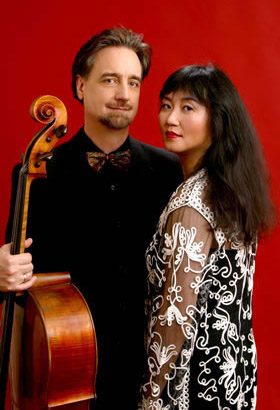When I was a kid, there was a boy I knew in the class two grades above me (he was two years older). I knew him because we were both faculty kids: his dad was the music teacher, and my mom taught fifth grade, as well as some music and theater. Actually, she had been one of his first music teachers, when he was just five, and I was three.
Today, he’s famous. He is, in fact, one of the finest cellists in the world.
When I was a teenager, I studied cello with him for a few years. Since Mstislav Rostropvich left the earth a few years ago, there is no cellist living I would rather hear. I listen to his playing every day while I write. His name is David Finckel.
Happily, David has made quite a few recordings, both as part of the multiple-Grammy-winning Emerson Quartet, and also as a duo with his wife Wu Han, the phenomenal pianist.
He is also a wonderful teacher, and has a series of online lessons, a delight to watch even if you don’t play the cello. (He calls these little videos “Cello Talks,” and he uploads them from all over the world—it’s worth watching them just to see the locations!)
David recently wrote an open letter to students of their chamber music program, most of it devoted to technical issues — but I was especially taken with a passage near the end, “The Visual Element: Messaging,” and thought I ought to share this excerpt with you.
As you read it, consider this: you may not be a performing chamber musician, but does what he’s saying apply to anything you do in your life? I’ll bet your answer is yes.
From the moment we walk on stage, the audience is watching our every move and following our lead. They will simply feel the way we look. If we look bored, they will feel bored. If we look terrified, they will be anxious too. If we look happy, they will be happy. This part is simple, but many, many performers do not realize it. Just see for yourself at the next concert you attend….
Musicians are not actors, nor are we trained to be, yet, what we do is remarkably like what actors do. We are given a script which we must prepare and interpret, and we must truly live in each moment of the musical narrative. If an actor loses focus, or breaks character, we know it right away. We cannot allow ourselves that mistake, and while it is what we do with our sound that is central to our art, we should not allow our work to be compromised by distracting or misleading visual habits on stage.
In comparison to opera and symphonic performances, there is not much to watch in chamber music. Very little else besides the natural interaction of the group, and the individual absorption of its members, is necessary or even appropriate for a performance of artistic integrity. But because the recipe is simple, one or two bad ingredients can easily ruin the dish.
Often, players may feel the music deeply but somehow it doesn’t come across that way….
Sometimes, as human beings, we fall short in the areas of sensitivity and communication — especially interpersonal communication in these days of text-messaging. We can always improve the way we say “thank you,” “I love you,” or simply, “this means a lot to me.” Often that means simply trying harder, doing it more sincerely or vehemently or exaggeratedly than we think is needed.
The composers — many of them hundreds of years before our time — were trying to communicate exactly those kinds of personal thoughts through their music. It’s our responsibility to carry those messages, to interpret them with unmistakable accuracy and deliver them powerfully.
“We can always improve the way we say Thank you, I love you or simply This means a lot to me” — well spoken, David!
And thanks for all the years, past and future, of silk-spun acoustic heaven.


Delightful and true. Thank you for this beautiful reminder.
John, Thank you for this… I love you, can’t wait to see you tomorrow!